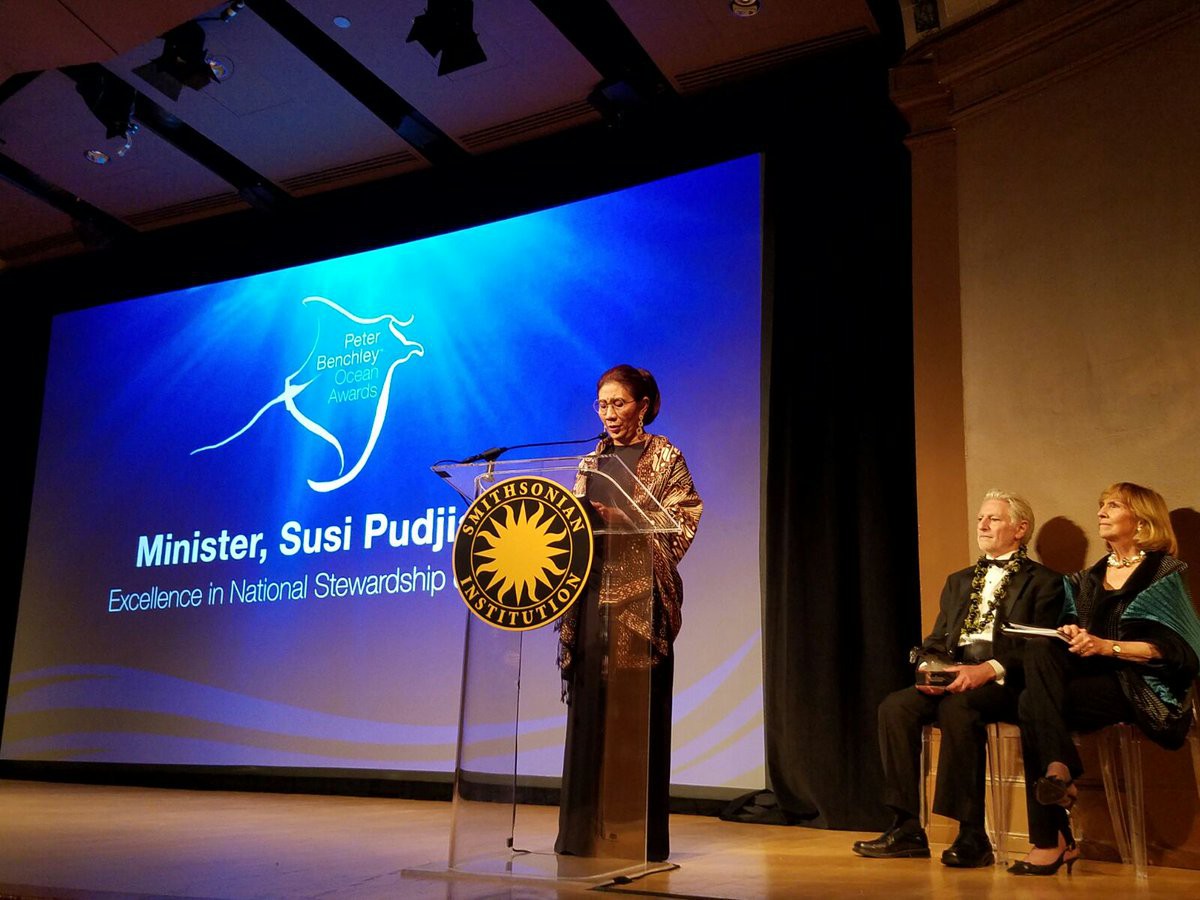
Indonesian fisheries minister Susi Pudjiastuti accepts the Peter Benchley Award for National Stewardship 2017, Washington DC. 12 May 2017-Twitter @kkpg
Jakarta, 21 Sha’ban 1438/18 May 2017 (MINA) – “Those who don’t eat fish, I will sink!” ends a video released by the Indonesian fisheries ministry last week.
“Fish is healthy and has lots of protein,” says a husky voiceover from the country’s fisheries minister Susi Pudjiastuti, now world-famous for her literally explosive approach to combating illegal fishing in Indonesian waters: blowing up and sinking illegal vessels.
Also Read: Saudi Arabia Wins Bid to Host World Expo 2030
“We hope Indonesian people stay healthy because they eat a lot of fish.”
Kicking off a lighthearted campaign to encourage an increase in Indonesians’ consumption of fish, Susi has become one of Indonesia’s most popular politician on the back of defending the nation’s rich marine resources, as well as the human rights of local fishermen.
Defending Indonesia’s Fish and Fishers
Also Read: 148 Products from Indonesia Promoted at Sarawat Superstore Jeddah
In most countries, fisheries mightn’t be the most desired or exciting ministry for a politician. But in the world’s largest archipelagic state which boasts 50,000 km of coastline and where fisheries puts some six million people in a job, it matters a lot.
Susi has come to receive international acclaim for helming the country’s crackdown on illegal fishing in its waters under a policy platform of three pillars: sovereignty, sustainability and prosperity.
Back when she joined as one of eight women in President Joko “Jokowi” Widodo’s Cabinet in 2014, however, some criticised the airline and seafood export mogul for being divorced, tattooed and a smoker. Today Susi is one of the most popular ministers in the government.
Her approach is tough: capturing foreign vessels illegally fishing in Indonesian waters, seizing the boats and charging the crew. Just last month 81 boats were blown up, adding to a total of literally hundreds destroyed on Susi’s watch.
Also Read: Packaging Industry Supports Halal Ecosystem
Netizens tweet at her and she responds. Indonesian fishermen proudly send photos of their abundant catches in waters not infiltrated by larger foreign boats, warmly thanking Minister Susi.
Her uncompromising approach has also gained admiration abroad, including Filipino government figures who have defended Susi’s rejection of foreign fishing trawlers – many of which are from the Philippines, Vietnam and China. She has even made a cameo in a manga comic book.
The minister’s efforts were recognised at the Smithsonian Institute in Washington DC on the weekend, as she won the Peter Benchley Ocean Award for Excellence in National Stewardship named after the famed director of “Jaws” and conservationist.
Susi has “aggressively protected her nation’s economic and environmental interests by targeting the multi-billion dollar pirate fishing operations of foreign fleets,” asiancorrespondent.com reported, citing the awarding committee.
Also Read: Indonesia-Japan Agree on Energy Transition Cooperation
“She has courageously and audaciously led the blowing up and sinking of more than 200 illegal fishing boats caught poaching—a strong deterrent to organised crime efforts that have invaded and overfished Indonesia’s biologically rich waters for years.”
“I am convinced that what we are doing now is right. The economic parameters are very remarkable. We see that the fight against illegal fishing is a profitable war,” said Bu Susi upon receiving the award, as quoted by Tempo.
“She has been instrumental in the freeing of slave crews held on many of these foreign vessels, and she’s led the freeing of illegally trapped whale sharks,” said the Peter Benchley Award.
Also Read: Dubai Expo 2020 Holds Special Event for Palestine
Slaves at sea
In January, Susi’s ministry announced a decree to serve as the basis for a human rights certification mechanism in the fisheries industry to ensure workers’ rights, in a global trade notorious for abuse and slave-like working conditions.
This is an important step. Indonesia is now the third largest producer of maritime labourers in the world, with some 200,000 working on fishing, cargo and cruise ship vessels globally, according to SBMI, the Indonesian Migrant Workers Union.
The Indonesian government predicts that the number is even higher, releasing a statement in September 2016 which claimed 300,000 Indonesian crewmen were not officially registered as sailors.
Also Read: Indonesia Increases Excise on Tobacco Products by 2022
Susi claimed that an estimated 700,000 workers in illegal fishing globally were Indonesian, many of whom are living in “slave-like” conditions.
Irrespective of the validity of these various figures, it is undeniable that vast numbers of Indonesians are working in fisheries at home and abroad – many in terrible conditions.
An report released by the International Organisation for Migration (IOM) in partnership with Susi’s ministry – the first collaboration between government, civil society and academic researchers on this issue – documents “extreme cases” of labour exploitation in fisheries.
It highlights systemic deceptive recruitment and exploitation of fishers, who it claims often work without sleep and for up to 7 days per week. Even worse, the report documents murder and “unlawful disposal of corpses” at sea.
Also Read: Indonesia to Become the Center of Sharia Economy in 2024
A special investigation by Indonesian magazine Tempo from January into Indonesian fishermen working on Taiwanese ships, found that typically fishermen are forced to work more than 20 hours per day.
The Associated Pulitzer Prize-winning investigation “Seafood From Slaves” – which found egregious breaches of fishermen’s rights in Indonesia – spurred the IOM report.
An anthropological study by Monash University’s Antje Missbach in 2016 showed that fishermen in eastern Indonesia are pushed by socioeconomic disadvantage and lack of opportunity into high-risk employment in people smuggling.
Defending their catch is, therefore, vital for defending livelihoods and human rights.
Also Read: Indonesia to Host World Tourism Day 2022
Towards a wealthy, fish eating Indonesia
Jokowi said in 2016 that poaching in Indonesian waters still costs the country US$20 billion per year.
Meanwhile, Indonesians only eat around 41kg of fish per capita annually, dwarfed by neighbours in Malaysia and Singapore who eat 70 and 80kg respectively.
Also Read: Chinese Companies Begin to Explore Lithium in Afghanistan
So there’s still plenty of work to be done.
But to date, says the Peter Benchley Award, Susi’s “work has proved vital to protecting Indonesia’s unique and world-famous marine ecosystem while also providing important economic benefits and sustaining the livelihoods of tens of thousands of domestic fishermen, their families and their communities.” (T/RS5/RS1)
Mi’raj Islamic News Agency (MINA)
Also Read: European Union Explores Cooperation in Sustainable Palm Oil Production in Riau







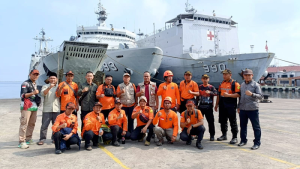
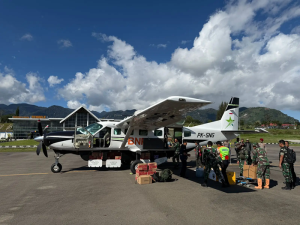




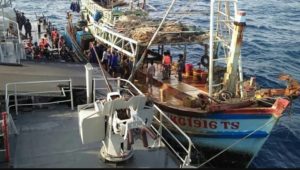
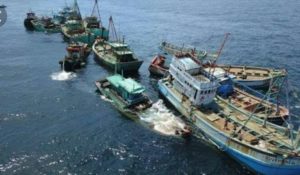
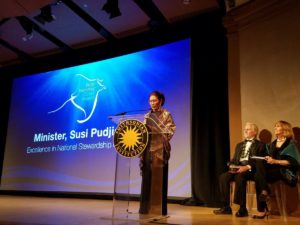

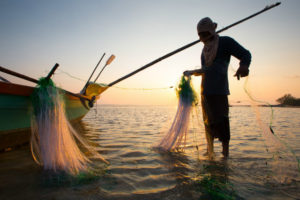













 Mina Indonesia
Mina Indonesia Mina Arabic
Mina Arabic